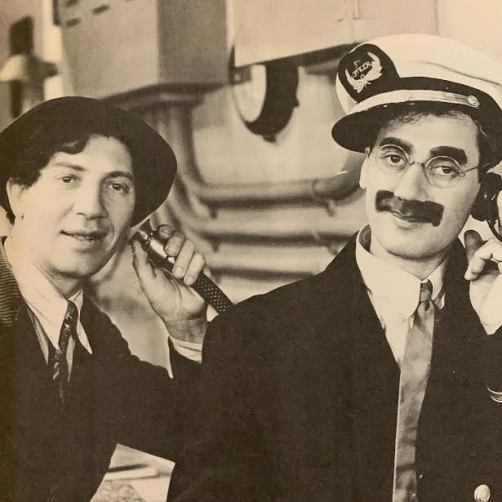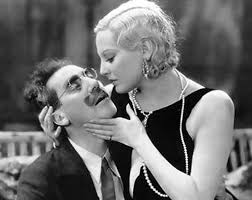Monkey Business (1931) represents a new phase for the Marx Brothers. Having realized that the movies paid them at least ten times what they could make on Broadway (and most of the brothers having spent 25 grueling years in the live theatre) they wisely opted now only to do movies. They packed their bags and moved to Hollywood, and never really looked back.
Consequently, Monkey Business is their first original movie vehicle (meaning it wasn’t adapted from a stage play). And it feels like it. Though confined to an ocean liner and a mansion, it seems to move around more. Directed by Norman McLeod (who unlike their previous two directors, was a creature of the talkies) the film has more set-ups. It breathes. Written by Will B. Johnstone (author of their first Broadway hit I’ll Say She Is) and S.J. Perelman, there is a freshness to it. It’s very physical. There’s a lot of running around.

This is because our four main characters are stowaways, perpetually on the lam. This is a Chaplinesque premise, and it makes for a more physical comedy (ironic, given that Robert Florey was a Max Linder man, and Victor Heerman had worked for Mack Sennett and L-KO). The Marx Brothers’ appearance at the top of this film is my favorite of any movie, although Chaplin’s in City Lights (which this one resembles) comes close. We hear them singing “Sweet Adeline” and then they emerge from barrels.
This is the most anarchistic of their films, literally so, the brothers are just transient bums. What makes this particularly interesting to me though is that it deviates from what I think of is as the ideal Groucho formula as found in Animal Crackers, Horse Feathers and Duck Soup (and to a lesser extent some of the others), i.e., Groucho as an inexplicable authority figure. Using that template, Groucho ought to have been the Captain of the ship in this movie, and the thought of that idea makes my mouth water. For one delicious scene in this film, he masquerades as the Captain – – and thus we find our explanation (if one were needed, probably best not to have one) for how he also became a leader of expeditions, the president of a college and the leader of a country. He stepped into the role when no one was looking.
Why does Monkey Business still work? Because, though Groucho is busted down to the social status of his brothers here, he remains existentially impervious to authority. He is still smart enough to run from danger, but no one, not gangsters, not sailors who can throw him in irons, can touch his spirit. The MGM films would spoil this, repeatedly allowing Groucho to be manhandled, humiliated, thrown down the stairs. That’s like erasing that “weird smile” from the face of the Mona Lisa.

The Marx Brothers are like cartoons. They are like Bugs Bunny. Any crisis is but momentary. They possess magical powers that can get them out of anything, and they are never threatened. Groucho, in this film, is at his most Harpo-esque. I love the bit when they invade the Captain’s stateroom, and Groucho puts the Captain’s hat on backwards. These are street kids, urchins, messing with shit. And they don’t need force. When the gangsters (Rockliffe Fellowes, Harry Woods) hand Groucho and Zeppo a couple of guns, they immediately drop them in water buckets with a gesture of distaste. Only oafs need guns. That’s as true in real life as it is in any Marx Brothers movie.
Once you realize this law about Groucho, there’s no reason they couldn’t have done more movies with this alternate formula. There’s something really nice about all four of them being on par. Audiences have always loved comedy quartets..from the barber shop days (evoked here by “Sweet Adeline”) all the way through The Beatles and the Monkees. No equivalents now? I’ve wanted to create one all my life.
A drawback of the move to Hollywood was that the team momentarily lost stage actress Margaret Dumont as their foil. As we saw in A Night at the Opera she fits right in on an ocean liner. On the plus side we get Hal Roach comedy star Thelma Todd as a beautiful gun moll. Ruth Hall plays Fellowe’s debutante daughter Mary, who gets kidnapped.

Ironically, though Johnstone was also a songwriter, Monkey Business has no songs. But it does have funny lines, and when you’re steeped enough in this stuff, you can pick out the ones S.J. Perelman wrote. It took me years to realize that all the boring gangster dialogue was actually subtle parody — he’d done this voice before in some of his short humor pieces. Some of the lines he gave Groucho were too much even for Groucho (that thing about the “kapelmeister”, and so Groucho crossed them out with a red pen.
Harpo shines many times in this movie. Especially memorable and evocative is his invasion of a children’s Punch and Judy Show, and his miraculous befriending of a frog. (Apparently the ship stocks frogs in its decorative fountain). And Chico has his great Columbus exchange, to rival the “viaduct” and “left handed moths” routines from the previous two pictures. And Zeppo’s role is much expanded, and much to the good. And there is the famous “Chevalier” bit, adapted from their earlier Theatrical Agent sketch.
For more on comedy film history please check out my new book: Chain of Fools: Silent Comedy and Its Legacies from Nickelodeons to Youtube, just released by Bear Manor Media, also available from amazon.com etc etc etc



This is one of my favorite films as well (along with Horse Feathers and Duck Soup, it’s a yearly viewing at New Years). The anarchy is fantastic ad there’s something genius about having four characters in a movie and having no idea what their background is. I also think this is a movie that had the best idea on how to use Zeppo. He became a sort of romantic lead (the sort of lead filled by others in their movies) and I thought it was a perfect idea. Other movies seemed to have no idea how to use him (so I can understand him eventually getting frustrated and leaving). This could have opened up a whole different dynamic, and since he was on the Marx frequency in comedy, he would best work with his brothers (as opposed to some of the other romantic leads who sometimes tended to drag the scene a bit).
This film also has one of my favorite Chico playing piano bits too.
LikeLike
Great analysis, Trav! This one is my favorite Marx film for many of the same reasons. It presents all the brothers, even Zeppo, as equals, yet that alleged restriction cannot stop any of them from assuming their rightful role in the quartet’s assault on society. Whether viewing it alone or with an audience, when Harpo walks along the table at the customs check-out and starts flinging papers everywhere, I just about fall on the floor in hysterics.
LikeLike
Thanks, Michael! Yep, they’re funny boys
LikeLike